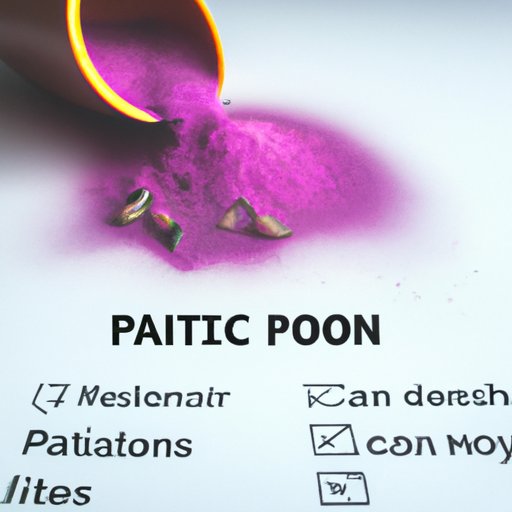Introduction
Rat poison is a chemical substance used to kill rats and other rodents. It is usually made up of active ingredients such as anticoagulants, zinc phosphide, and bromethalin, which act to interfere with the body’s natural processes and cause death. Rat poison is often used in homes and businesses to control rodent infestations, although it can also be used for other purposes. In this article, we will explore how rat poison works, the different active ingredients used in rat poison, the toxic ingredients and their effects, the dangers of rat poison exposure, the different types of rat poison on the market, and the pros and cons of using rat poison.
Exploring the Science of Rat Poison: How Rat Poison Works
Rat poison works by interfering with the rodent’s body’s natural processes, leading to death. The most common active ingredients used in rat poison are anticoagulants, zinc phosphide, and bromethalin. Anticoagulants work by preventing the blood from clotting normally, causing internal bleeding and eventually death. Zinc phosphide works by releasing toxic gas when it comes into contact with stomach acids, leading to death through suffocation. Bromethalin works by disrupting the rodent’s nervous system, leading to seizures and eventually death.
Investigating the Toxic Ingredients in Rat Poison and Their Effects
Rat poison contains a variety of toxic ingredients, all of which can have varying levels of toxicity depending on the amount ingested. Common ingredients used in rat poison include warfarin, brodifacoum, bromadiolone, and chlorophacinone. Warfarin is an anticoagulant that interferes with the body’s ability to form clots, leading to internal bleeding and eventual death. Brodifacoum is another anticoagulant that works in a similar manner. Bromadiolone is an anticoagulant that is slower acting than warfarin and brodifacoum, but still has a high level of toxicity. Chlorophacinone is a slow-acting anticoagulant that can cause symptoms such as vomiting, weakness, and diarrhea.
In addition to these active ingredients, rat poison also contains a variety of other toxic ingredients, including zinc phosphide and bromethalin. Zinc phosphide is a metal salt that releases a poisonous gas when it comes into contact with stomach acid, leading to suffocation and death. Bromethalin is a nerve toxin that disrupts the rodent’s nervous system, leading to seizures and death. All of these ingredients can be highly toxic if ingested.

Understanding the Dangers of Rat Poison Exposure
Ingesting rat poison can have serious health consequences for humans and animals alike. In humans, rat poison exposure can lead to nausea, vomiting, abdominal pain, dizziness, and difficulty breathing. In extreme cases, rat poison can cause liver failure, kidney failure, and even death. In animals, rat poison can cause a variety of symptoms, including lethargy, loss of appetite, seizures, and even death.
Additionally, rat poison can be harmful to the environment. When rat poison is used outdoors, it can leach into the soil and contaminate groundwater, leading to long-term environmental damage. Additionally, rat poison can be harmful to pets and other wildlife, as they may accidentally ingest it or come into contact with it.

Examining the Different Types of Rat Poison on the Market
There are several different types of rat poison available on the market today. These include single-ingredient poisons, multi-ingredient poisons, and bait blocks. Single-ingredient poisons contain only one active ingredient, such as warfarin or bromethalin. Multi-ingredient poisons contain multiple active ingredients, such as warfarin, brodifacoum, and chlorophacinone. Bait blocks are solid blocks of rat poison that can be placed in areas where rats are known to travel.
Each type of rat poison has its own advantages and disadvantages. Single-ingredient poisons are generally less toxic than multi-ingredient poisons, but they may be less effective. Multi-ingredient poisons are more toxic, but they may be more effective in killing rats. Bait blocks are the least toxic of the three types of rat poison, but they may not be as effective as other types of rat poison.

Analyzing the Pros and Cons of Using Rat Poison
Using rat poison can be beneficial in controlling rodent infestations, but it also carries some risks. On the plus side, rat poison can be effective in killing rats and other rodents quickly and efficiently. Additionally, rat poison can be easy to use and can be found at most hardware stores. However, rat poison can also be dangerous if not used properly. Ingesting rat poison can be hazardous to humans, pets, and other animals, and it can be harmful to the environment if not used properly.
Conclusion
Rat poison can be an effective way to control rodent infestations, but it should be used with caution. Understanding how rat poison works and the potential risks associated with it is important for anyone considering using it. If you decide to use rat poison, make sure to follow the directions carefully and take all necessary precautions to ensure your safety and the safety of others.
In conclusion, rat poison can be a useful tool in controlling rodent infestations, but it should be used with caution. Make sure to understand how rat poison works, the different active ingredients used in it, and the potential risks associated with using it. By taking the necessary precautions, you can help ensure that rat poison is used safely and effectively.
(Note: Is this article not meeting your expectations? Do you have knowledge or insights to share? Unlock new opportunities and expand your reach by joining our authors team. Click Registration to join us and share your expertise with our readers.)
